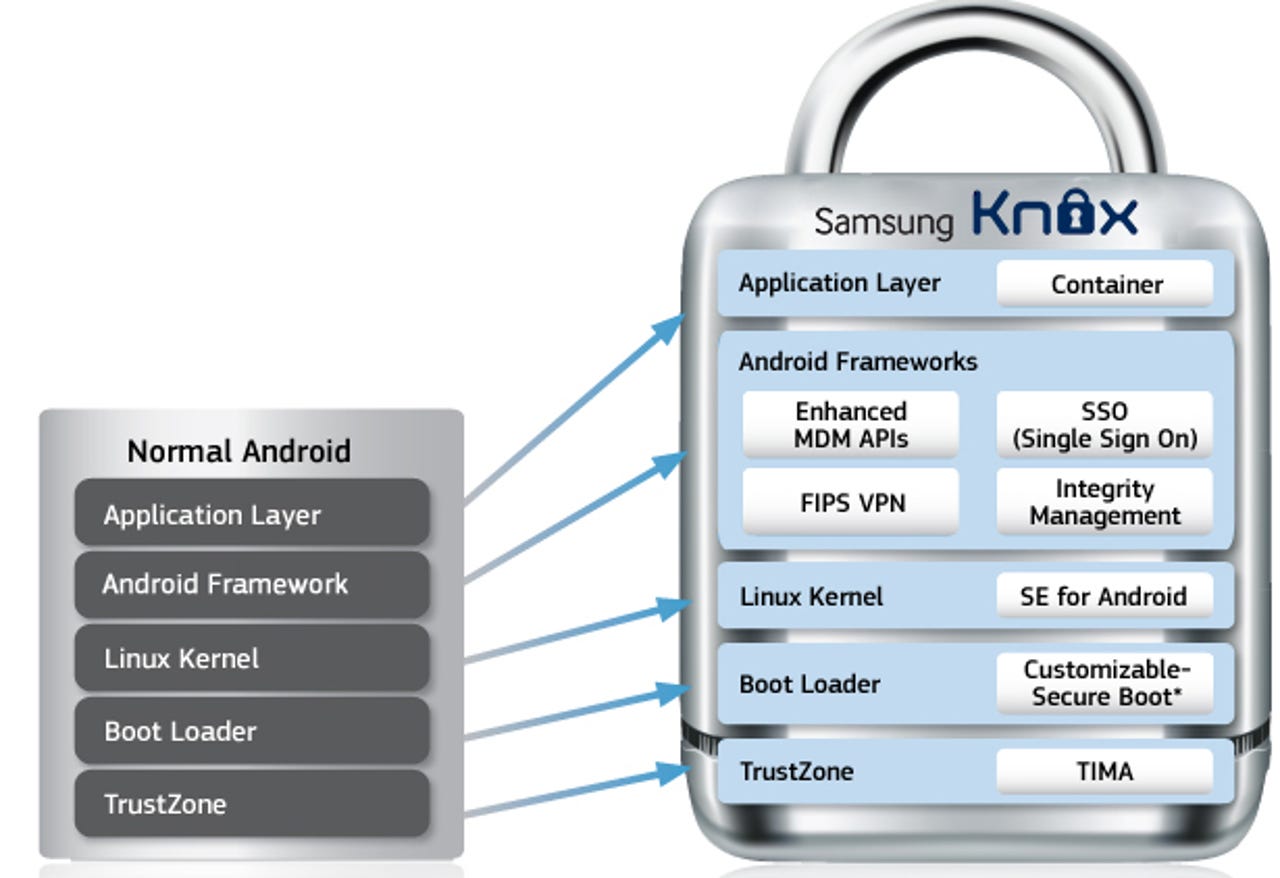Samsung's Knox pilots ramp: 8 takeaways

Samsung's Knox technology, which is designed to secure Android for easier enterprise adoption, has 29 global pilots under way that are expected to go production shortly.
Overall, the Knox technology, available on the Galaxy S4 and the latest Galaxy tablets and Notes, has gone a long way toward giving Android some enterprise credibility. Knox enables employees and companies to create work and personal containers to keep data segregated in a bring-your-own-device scenario.
Employees were already bringing Android devices to work, but iOS has been viewed as largely more secure. By shoring up Android on the security front and plugging the mobile platform into mobile device management software, Samsung has made its devices much more corporate friendly.

We recently caught up with Samsung’s Jae Shin, vice president of the Knox unit in the company's mobile division, and his business-to-business team. Here's a look at the key takeaways from the conversation.
Smartphones driving Knox adoption...for now?
Shin said smartphones are driving adoption, but in the key verticals such as financial services and healthcare tablets are front and center. "We're seeing different usage scenarios for the Galaxy Note and tablets," said Shin. For now, the Knox charge is being led by the Galaxy S4.
Is Knox in production environments yet?
Shin said that Samsung has 29 pilots globally with its Knox technology and there has been a lot of interest. Most of those pilots---in government agencies and elsewhere---are expected to go production in the near future. Gauging from the interest, Shin said that more pilot-to-production waves will follow.
What has enterprises interested?
The most obvious push for Samsung's Knox technology is the bring your own device movement. Shin explained that with Knox, a person's work and home personas can be pushed to the bare metal level and the trust zone architecture in the Qualcomm chipset. "There are a level of checks up the stack and that's a real security enhancement for Android," said Shin.
What mobile device management platforms will link up to Knox?
Shin said there are nine global mobile device management platforms partnered with Samsung. Those partners are global and regional. "We do the vetting," said Shin, nodding when I pointed out there are more than a 100 MDM vendors. On the local level, Shin said MDM partners are recommended by subsidiaries in places like China, Russia and France. Most of the big players such as Airwatch and MobileIron are able to connect with Knox. Would Samsung ultimately hook up with BlackBerry's MDM software? "We haven't considered BlackBerry. That would have to be a business decision above my pay grade," said Shin.
Would Samsung take its Knox technology to secure other Android devices?
Probably not, said Shin. "To harden and secure the device you have to have control of the chipset and Android framework. That's tough to do for other devices you don't design," said Shin.
Main verticals for Samsung
The main push for Knox adoption is in regulated industries such as financial services, government and healthcare. These industries are seeing BYOD trends and need to secure Android devices. Samsung is seeing enterprises that still buy hardware for employees and the aim is to get Samsung devices on a preferred list. Knox goes a long way. Education is also a key market and most mature for Samsung's B2B unit as is retail. The objective for Samsung is to show how its devices work together in the field.
What are the hurdles?
Shin said that the biggest hurdle for Samsung in the enterprise was "the belief that Android wasn't secure." "That hurdle is much lower now and we have to target different segments with the right device at the right time," said Shin.
Will wearables become a BYOD security issue?
Shin, who was sporting a Samsung smart watch, said enterprises are interested in future proofing, but haven't started worrying about wearables just yet. "I would not be surprised if there an enterprise solution for wearables emerges," said Shin. Samsung prefers to let the ecosystem find business uses for its gear.
Related: